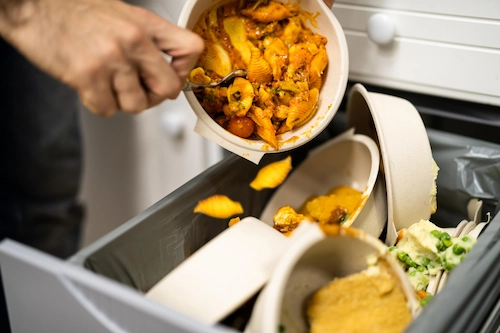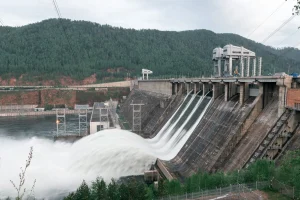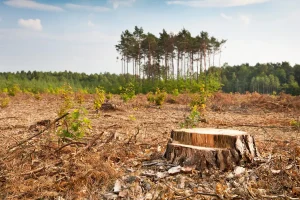Table of Contents
Have you ever had leftover food on your plate? Or perhaps you have unknowingly thrown away food because you forgot to cook it, and it ended up rotting in the fridge? These things are considered food waste!
Food waste is a serious issue that needs to be addressed. So, before discussing how to reduce food waste further, let’s first understand what food waste is, its impacts, and the steps you can take to help reduce it. Let’s take a look!
What Is Food Waste?
Food waste is food that is thrown away or not consumed, whether it is still edible or has gone bad. This is generally caused by decisions and actions by retailers, food service providers, and consumers.
The emergence of food waste is generally related to consumption behavior and errors in food storage. In short, food waste occurs at the final stage of the food production chain.
Food waste is often compared to food loss. The difference between food loss and food waste lies in the stage at which it occurs. Food loss refers to the decline in the quality of raw food ingredients that makes them unsuitable for processing into food.
This situation typically occurs early in the production chain, such as at the farm or in the factory, and is caused by infrastructure, climate, and environmental constraints, or disregard in the production, storage, and distribution processes.
Therefore, food loss occurs before food enters the consumption chain, while food waste occurs when food is ready or nearly ready to be consumed.
Read also: Beware! Don’t Underestimate This Waste in Your Home!
The Impact of Food Waste

Food waste can have significant impacts on both humans and the environment. From a human perspective, wasted food creates unequal food distribution. While some people throw away food, many still suffer from hunger and malnutrition.
Meanwhile, for the environment, food waste is a major contributor to greenhouse gas emissions, particularly methane (CH₄), which is more potent than carbon dioxide (CO₂).
Food waste is organic waste, so it can decompose biologically. However, if the decomposition process occurs in closed, airless landfills, it produces methane gas.
The Food and Agriculture Organization of the United Nations (FAO) estimates that approximately 8–10% of global greenhouse gas emissions come from food waste. If not properly managed, the buildup of methane gas can lead to hazardous incidents, including the risk of explosions.
In addition, food waste generates leachate—a liquid byproduct that can pollute nearby soil and water sources. If not promptly addressed, water and soil pollution can endanger surrounding communities.
The Problem of Food Waste in Indonesia
Food waste is a significant problem in Indonesia. Based on the 2021 Food Waste Index Report by the United Nations Environment Program, Indonesia was the largest food waste producer in Southeast Asia, generating approximately 20.93 million tons of food waste annually.
Moreover, food waste accounts for the most significant portion of total waste. According to data from the Sistem Informasi Pengelolaan Sampah Nasional (SIPSN), food made up 40.38% of Indonesia’s total waste in 2022.
From an environmental perspective, the UNEP report also noted that approximately 8–10% of global greenhouse gas emissions came from wasted food, including from the household, retail, and food service sectors.
Read also: What Is Organic Waste? Find Out the Types and Benefits!
How to Reduce Food Waste
Reducing food waste requires a multiple approach, but the easiest way to reduce it is to start with your eating habits. Here are some steps you can take to reduce food waste:
1. Manage Portion Sizes According to Need
Managing portion sizes according to need can begin with cooking small quantities, especially if you are only cooking for yourself. If you cook large portions, you can share them with others. This not only helps reduce food waste but also strengthens your relationships with those around you.
2. Appreciate Food More
One effective way to reduce food waste is to consume food consciously. This means appreciating each meal you consume and consuming it responsibly. Even when ordering food, choose portions according to your needs to avoid overeating. Besides reducing food waste, this habit also saves you money.
Furthermore, a study published in the journal Eating Behaviors found that men who ate until they were 80% full needed less energy for activity. The foods they consumed mainly were vegetables and a few grains.
Meanwhile, women do not have a significant difference between food and energy consumption. However, these factors do influence their Body Mass Index. This means you do not need to eat until you are extremely full to perform optimally. What you need to pay attention to is the type of food you consume and the portions.
3. Make a Food List and Buy According to Need
To keep your food supply more organized at home, make a list of the groceries you still have and only buy what you need. You also need to pay attention to the food you store in the refrigerator to ensure it remains useful and does not spoil quickly.
For example, separate raw ingredients, such as meat, from cooked ingredients to prevent them from contaminating the cooked ingredients. Also, ensure the containers or lids you use to store food in the refrigerator are clean and safe.
You can use tightly sealed containers, aluminum foil, or plastic wrap to store food. However, once you have thawed frozen food, avoid refreezing it, as bacteria can grow during the thawing process.
The next tip is to avoid impulsive shopping when you are hungry and focus on buying what you need, not what you want.
4. Process It Into Compost
Food scraps like small bones or eggshells can be processed into compost to return their nutrients to the soil. You can compost your waste by digging a hole in your yard or using a modern, practical, odor-free composter. Besides nourishing plants, this method also helps reduce the burden on landfills and methane emissions.
That was a complete explanation of food waste, from its definition, its impacts, to simple ways you can tackle it. Reducing food waste is a small step that has a significant effect on the planet’s sustainability.
If you care about environmental issues and want to start adopting a more sustainable lifestyle, now is the time to become part of the #SiPalingSustainable movement!
This campaign invites you to participate in various fun and practical challenges to achieve an eco-friendly lifestyle. What’s more, you are not alone; many other Warga Asri will also be contributing.
Come on, be part of the change with Indonesia Asri and register yourself to take small steps towards a greener future!
Read also: Deriving benefits from household waste










